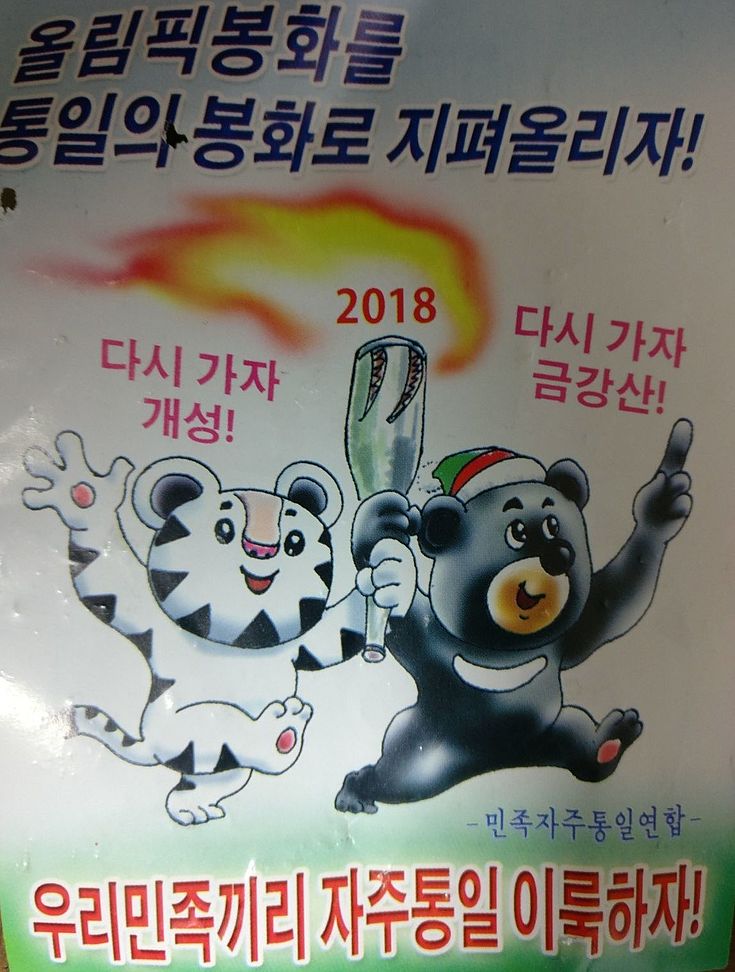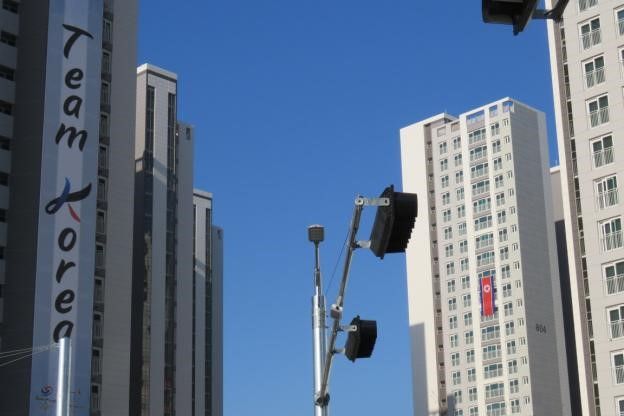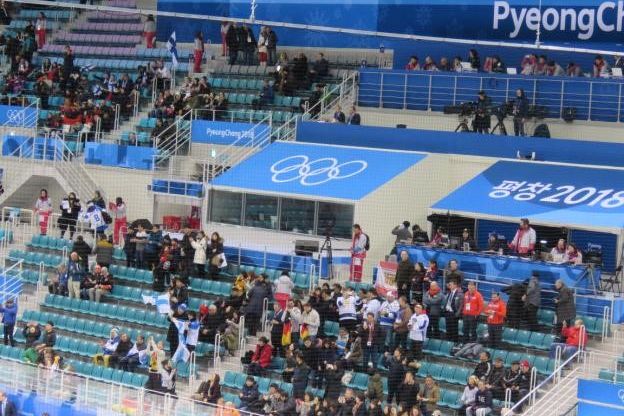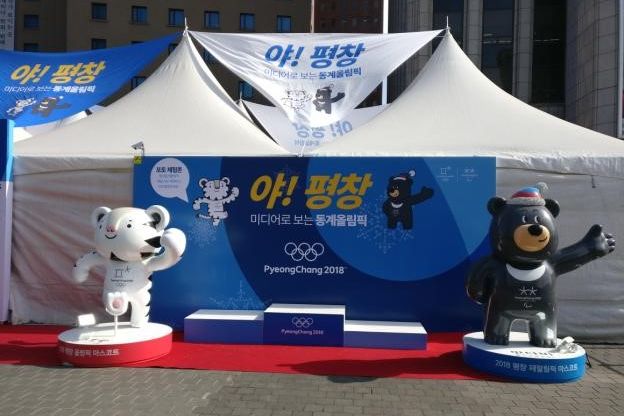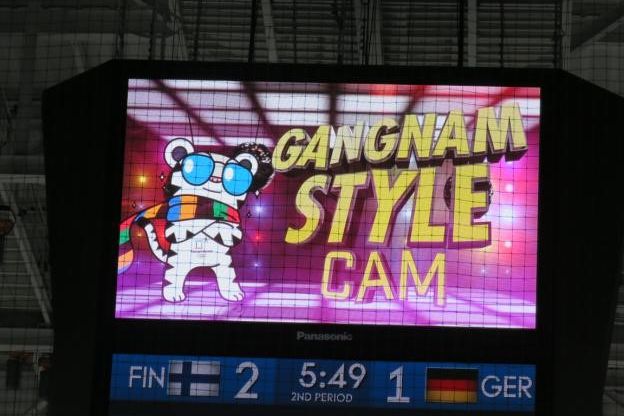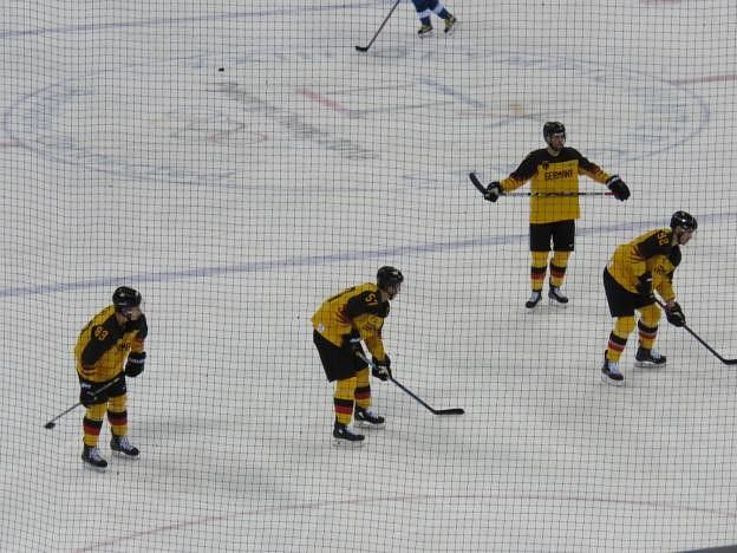Olympic Winter Games
“Peace Olympics” or “Pyongyang Olympics”?
While the fight for medals at the Olympic Games in South Korea’s Pyeongchang is in full swing, the medal for best political self-portrayal has already been awarded to the North Korean team. A high-ranking delegation with a member of the Kim Dynasty (for the first time since the truce agreement in July 1953), a brigade of pretty cheerleaders, a large orchestra, and a small number of athletes who were able to participate in the Games thanks to a special permission by the International Olympic Committee, stole the show from all other participants, including the host country South Korea.
„Let’s go to Kaesong“, “Let’s go to Kumgangsan” – this North Korean flyer suggests South Korean support for the re-opening of the controversial large-scale projects for unification, which on the one side meant millions for the North Korean regime, and on the other side brought encounters between thousands of North and South Koreans. The reality looks more disillusioned: The South Koreans’ reaction to North Korea’s charm is cold and calm.
No concessions in nuclear policy
This is definitely benefitting North Korea: the whole world is once again looking eagerly to the Korean Peninsula, this time with relief after the fears of the last two years. North Korea enjoys publicity without having any share in the athletic, financial, or political (in the sense of an "Olympic truce") aspects of the Olympics, all while not even having made any concessions in its nuclear policy. To take this even further, just a day before the opening of the Olympics, North Korea held a large military parade - which was rather 'restrained' for North Korean standards (for example no live broadcast), but still illustrated North Korea's claim to be a nuclear power.
However, North Korea's participation is also beneficial for South Korea's president Moon: Until now, his North Korea policy, which was supposed to be a central element of his government's policy, has been full of failures. Instead of reaching relaxation, the provoking manner of the Trump administration towards the ever more aggressive North Korea lead to always higher confrontation. Accordingly, the South Korean government was very relieved when the North Koreans participated in the Olympic Games after all. Generally speaking, the South Korean citizens also see this development in a positive light. Even though the war hysteria wasn't as big here as it was in the foreign media, the continuous escalation of the conflict started to get on people's nerves. But at the same time, it became clear that the enthusiasm during the Sunshine Policy of the early 2000's is over: while the media was eager to take in the spectacle around the cheerleaders from North Korea, the citizens' reaction was rather cold. In general, there is a big approval for dialogue with North Korea, but - unlike North Korea and South Korean President Moon Jae-In might be thinking - the skepticism towards North Korea grew after the country's aggressive manner in the last years.
An unusual picture for South Korea – here you see the Olympic Village with the South Korean team’s lodging on the left and the North Koreans’ lodging with the North Korean flag on the right. The North Korean flag is prohibited in South Korea.
Invitation to a summit meeting in North Korea
Government critics from South Korea's freedom party, the conservative opposition party, accuse the Moon government of having turned the 'Pyeongchang Olympics' into the 'Pyongyang' Olympics. More accurately, it was the media - especially South Korean and American media who were originally skeptical towards North Korea's peace overture - that leaped at the pictures of attractive cheerleaders in chic costumes. The visit of the aged, nominal head of state Kim Yong-Nam, leader of the presidium of the highest People's Assembly, and even more importantly Kim Jong-Un's sister Kim Yong-Jong, two very high tiers, was surely adding to the media hype. This was the first time ever that a member of the Kim-Dynasty traveled from the North to the South.
The highlight of the meeting of South Korean president Moon with Kim Jong-Un's sister Kim Yo-Jong was the handover of a letter inviting Moon to an "earliest possible" summit meeting in Pyongyang. After president Kim Dae-Jung (2000) and president Roh Moo-Hyun (2007), Moon would be the third South Korean president to travel to Pyongyang for a summit meeting. The symbolism of such a visit - the South Korean president makes a courtesy call on the North Korean dictator - is well-known to both sides, just like the problem that such a travel, unless it is linked to very specific preconditions, could soften the sanctions policy towards North Korea. Therefore, it was smart of president Moon to neither confirm nor cancel, but instead pointing out that the conditions for such a meeting must be fulfilled. By now he has again taken the stage and explained that a dialogue between North Korea and USA has to take place before even thinking about a summit meeting.
Satisfied fans, but half empty seats – a result of the IOC’s and South Korea’s ticketing policy.
Openness to dialogue?
This package deal is important: North Korea has been refusing dialogue with the USA, but at the same time, in the original North Korean way, has complained about its delegation to the Olympics being ignored by the USA. Dialogue would not be forced, the state media declared even after the Olympics. But "it could be that the USA might get impatient" (to start such a dialogue). In this way, there is a loophole to have an explanation in the case of a dialogue. We shouldn't forget that the frequent changes of policy produce quite a lot of need for explanation at home - maybe more towards the officials than towards the citizens. The USA have signalized readiness for talks, but also made clear that the policy of most stringent sanctions will be continued. In accordance, US vice president Mike Pence was awkwardly avoiding talking to the North Koreans during his visit to the opening of the Winter Olympics.
The North Korean delegation has left. What's next? There could be military talks about the relaxation of the situation in the immediate border area as requested by South Korea, but not yet confirmed by North Korea. There would be enough topics for such a meeting, as well as concrete goals, for example a possible stop of propaganda messages that both sides regularly blast per loudspeaker over the otherwise quiet demilitarized zone.
Soohorang (white tiger) and Bandabi (Asiatic black bear) are the mascots of the Winter Olympics and Paralympics, respectively. They are rooted in the Korean mythology, especially in the Gangwon province where the Olympics are taking place.
Will there be talks?
However, military talks are not attractive for North Korea, because this would mean an upvaluation of the South Korean military forces, that the North Korean propaganda calls puppets of the USA. For South Korea, family reunions surely have high priority. These relatively short two to three-day reunions usually take place in a North Korean resort (condominium) in the Kumgangsan mountains close to the border area. South Korea was using it for tourism, until a tourist was shot by a North Korean soldier in 2008. These reunions are politically relatively unproblematic for North Korea and urgent for South Korea. After 70 years of separation, the number of people still alive and wishing to see their siblings keeps getting smaller. Out of the originally 130,000 South Koreans registered for these reunions at the Ministry for Unification, 70,000 already died.
At the same time, it has to be mentioned that South Korea's scope for concessions - that only make sense if North Korea moves politically - is almost zero right now: all options of economic cooperation that were available during the Lee Myung-Bak and Park Geun-Hye era are now impossible due to sanctions. Among these are the re-opening of the Kaesong industry complex and the Kumgangsan tourism project that North Korea hopes for, large-scale projects for which North Korea received millions from the South.
Having the North Koreans participate in the Olympics - which was entirely paid for by the South (2.64 million USD were taken from the unification fond) - needed continuous counseling with the US ministry of finance to check if everything was compatible with the sanctions. South Korea would have to try to change the sanctions - which requires confirmation by the USA who are very skeptical towards the relaxation process - before being able to make a substantial offer to North Korea.
Of course, the Olympics are a perfect advertisement for the modern country South Korea with its enthusiasm for technology and its cultural influence.
Verbal willingness for peace
But this is only a possibility if North Korea moves a whole lot from its current position, which is not to be expected. In the worst case, as usual, there could be a phase of disillusionment, or even worse, North Korea affirming its stance with new provocations. On the other hand, North Korea seems to really have an interest in dialogue and relaxation, as Kim Jong-Un himself affirmed when welcoming the delegation returning from South Korea. The high tier delegation to the Games as well as the exceptionally tame propaganda are also a sign of this.
The sanctions and the economic pressure caused by them - especially on the elites of the country - are surely the trigger of this verbal willingness for peace. But, in order to break the sanctions towards North Korea there have to be concrete results that can only be achieved in negotiations with the USA, be it bilateral or multilateral, for example the Six Party Talks. It is still unclear how it could come to this. However, it is in the interest of the whole world community that the Olympic breeze of peace turns into a strong wind of opening for North Korea. Germany could try to support this with own initiatives, for example be available as a place for talks for all parties involved.
Oh right, we were talking about the Olympic Games... after the North Korean delegation left, the media reports finally switched back to the essence of the Games: the competitions. South Korea as well took advantage of this opportunity to present itself as a modern state and simultaneously proudly point out its long cultural tradition. The organization wasn't always perfect - the large distance between the Game sites and the capital Seoul, a lack of train connections and half empty stadiums were a problem. But other than that, the visitors see the Games as a fest of emotions and worldwide connection. Just like the motto of the Games: Passion. Connected.

